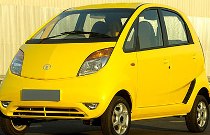 | « Back to article | Print this article |
 Ashok Raghunath Vichare's house in a quiet corner of suburban Mumbai is still abuzz with activity - camera flashes, television bytes, flurry of questions and curious journalists.
Ashok Raghunath Vichare's house in a quiet corner of suburban Mumbai is still abuzz with activity - camera flashes, television bytes, flurry of questions and curious journalists.
"People are flying thousands of kilometers just to talk to me. People from Australia, the US, France and Korea have visited my home. If it weren't for the Nano, who would have known me?", asks the 56-year-old government servant and the first buyer of the world's cheapest car.
While Nano has brought unprecedented fame to the Vichares, it has revolutionised travel for more than 25,000 others - out of the 100,000 people selected through a ballot to be the first recipients of the car - till date.
To speed up delivery, the company is ramping up production at two manufacturing plants in Uttarakhand and Gujarat. It is hopeful of completing the delivery process (for 100,000 cars) and possibly reopen bookings well before the end of this year.
Company officials say the new Sanand plant in Gujarat, shifted out of Singur in West Bengal, with a capacity of 500,000 units per annum will start commercial operations later this month. The Pantnagar plant in Uttarakhand has the capacity to produce 70,000 units annually.
The Nano - cheaper by about 57 per cent to the nearest competitor, Maruti Alto, in the first 45 days of booking - is expected to fetch a resurgent demand this time too.
The demand for cheap and personal transport in India made some of the world's biggest and veteran car makers scamper to their drawing boards in an attempt to replicate the feat achieved by Tata Motors.
While some, like Korea's biggest automotive brand Hyundai, are striving to roll out a Rs 2,00,000 car that will have an engine capacity of less than 800cc, Bajaj-Renault-Nissan alliance suffered a setback following differences over the positioning of their low-cost car.
As many as six international auto companies -- General Motors, Nissan, Fiat, Hyundai, Volkswagen and Bajaj Auto -- are in the race to build mini cars to rival Nano in terms of pricing and quality.
Nano is expected to have its first competitor in the second half of next year when Hyundai's low-cost car hits the market, followed by Bajaj's small car in 2012.
Tata Motors is facing a tough challenge in terms of pricing. While the concept behind the car revolves around low-cost manufacturing, surging raw material prices has put added pressure on the company.
Industry experts say that Tata Motors will have to make an upward revision in prices when bookings reopen later this year.
To add to its woes, the manufacturers faced negative publicity on safety issues - last year and early this year - with five Nanos reportedly catching fire.
The company was prompt to take action against the supplier of the electrical switch -believed to be responsible for the initial defect. However, when a moving Nano burst into flames late last month, company officials had to little to say.
"We are investigating the matter" is all that Prakash M Telang, managing director, India operations, Tata Motors, said.
Several of the more than 200,000 applicants cancelled their bookings due to the prolonged period of delivery. Some customers sold their allotments at a premium. The car has also lost its premium tag in the used car market following the fire incidents.
Nano commanded a premium of 20-25 per cent barely three months back but prices have now cooled to the on-road price.
Hurdles such as these, however, have not deterred the company in taking the people's car overseas to developed markets such the United States and Europe and Africa. Tata Motors is gearing up to launch the European version of Nano (Nano Europa) next year.